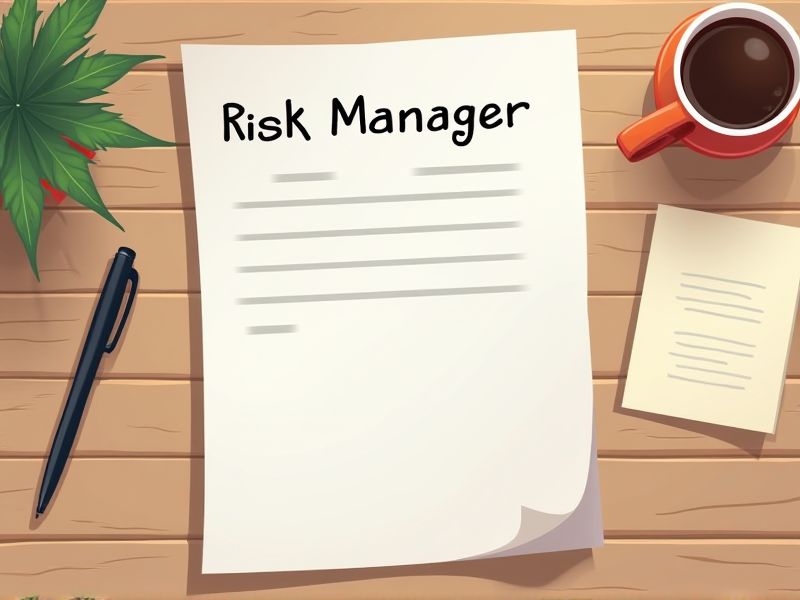
Risk managers navigate complex financial landscapes that involve identifying, analyzing, and mitigating risks. Possessing specific certifications ensures they have standardized knowledge and skills crucial for making informed decisions. Certifications validate expertise in regulatory compliance, risk assessment, and strategic planning, which are imperative for effective risk management. Below are some essential certifications you may need for a career as a risk manager.
Financial Risk Manager (FRM)
A Financial Risk Manager (FRM) is needed because they possess specialized knowledge in identifying and analyzing market, credit, and operational risks that can impact an organization's financial stability. Their expertise in risk assessment tools and methodologies helps organizations to strategically mitigate potential losses. Having a certified FRM enhances credibility and trust among stakeholders as they understand regulatory compliance and global financial regulations. As financial markets become increasingly complex, an FRM provides insights and strategies necessary to navigate potential disruptions effectively.
Professional Risk Manager (PRM)
The complexity of global financial systems necessitates a Professional Risk Manager to accurately identify and manage potential market, credit, and operational risks. Regulatory requirements for organizations impose stringent risk management protocols, and a PRM ensures compliance through expert knowledge. Economic volatility and unforeseen events increase the likelihood of financial loss, warranting the expertise of a PRM to devise strategic risk mitigation plans. Companies seeking to maintain stakeholder confidence and competitive advantage depend on the PRM's ability to predict and manage risks effectively.
Chartered Enterprise Risk Analyst (CERA)
Chartered Enterprise Risk Analysts (CERAs) provide specialized expertise in assessing integrated risk across various sectors, enhancing a Risk Manager's capability to identify potential threats. CERAs use advanced quantitative and qualitative tools to evaluate complex risk scenarios, which can lead to more informed decision-making processes. Their certification ensures a standardized understanding, which can improve consistency and reliability in risk management practices. Employing CERAs often results in more robust and comprehensive enterprise risk management frameworks.
Certification in Risk Management Assurance (CRMA)
Certification in Risk Management Assurance (CRMA) enhances a risk manager's credibility, reflecting their expertise in managing and assessing risk. CRMA provides structured knowledge in areas like governance, risk management, and control processes, improving decision-making capabilities. It signals an individual's commitment to continuous learning and professional growth, meeting industry demands for advanced risk management skills. Earning CRMA potentially leads to career advancement, as organizations increasingly seek certified professionals to lead and innovate in risk assurance roles.
Certified Risk Manager (CRM)
A Certified Risk Manager (CRM) designation provides specialized knowledge essential for effectively identifying and managing potential risks within an organization. This certification enhances a risk manager's ability to design strategies that mitigate financial losses, improve operational efficiency, and uphold regulatory compliance. The structured curriculum of the CRM program equips professionals with advanced tools and methodologies to assess risk systematically and accurately. Employing a certified risk manager ensures informed decision-making, bolstering organizational resilience and stability.
Certified in Risk and Information Systems Control (CRISC)
CRISC certification is crucial for a Risk Manager because it validates expertise in identifying and assessing IT risk. This credential enhances an individual's ability to implement robust information system controls, aligning with industry standards. With CRISC, a Risk Manager is better equipped to effectively communicate risk-related issues to stakeholders. The certification also elevates the professional credibility and career prospects of a Risk Manager in the competitive job market.
Certified Information Security Manager (CISM)
CISM certification equips a Risk Manager with comprehensive understanding of information security governance, vital for aligning security strategies with organizational goals. The specialized knowledge in risk management and incident response strengthens the ability to effectively identify, assess, and mitigate risks. CISM credential demonstrates a high level of expertise and commitment, instilling confidence in stakeholders regarding risk management capabilities. This certification improves decision-making skills by integrating security programs with enterprise operations, crucial for minimizing potential security breaches.
Certified Information Systems Security Professional (CISSP)
A Risk Manager often requires a Certified Information Systems Security Professional (CISSP) because it ensures a comprehensive understanding of the critical aspects of information security, essential for identifying potential threats. CISSP certification provides the technical knowledge required to develop effective risk management strategies, aligning security best practices with organizational goals. Holding a CISSP also demonstrates a commitment to maintaining high professional standards, crucial for instilling confidence in stakeholders. Furthermore, the knowledge gained through CISSP equips risk managers with the skills necessary to navigate complex regulatory environments, mitigating legal and compliance risks.
Certified Internal Auditor (CIA)
Certified Internal Auditors (CIAs) have deep expertise in risk assessment, which enhances a Risk Manager's ability to identify and mitigate potential threats. Their training provides a structured approach to evaluating internal controls, improving the Risk Manager's capability to ensure compliance and operational efficiency. CIAs bring a comprehensive understanding of regulatory environments, aiding Risk Managers in navigating complex legal frameworks. They also contribute to building transparent and reliable reporting mechanisms, which are crucial for informed decision-making and maintaining stakeholder trust.
Project Management Professional (PMP)
Project Management Professional (PMP) certification instills a deep understanding of standardized project management practices, vital for a risk manager to identify, analyze, and mitigate potential project risks effectively. It enhances a risk manager's ability to communicate and align risk strategies with project goals, fostering better decision-making. The PMP credential validates expertise in handling project constraints, which is essential in minimizing negative impacts from unforeseen risks. Employers often prefer risk managers with PMP certification as it signifies a commitment to quality and proficiency in managing project complexities.
Summary
As you, the reader, obtain risk management certifications, your ability to identify, assess, and mitigate potential risks enhances significantly. This credentialing often results in increased credibility and trust among stakeholders and employers. Consequently, career advancement opportunities and salary potential may improve. Such certifications typically lead to a more structured and effective approach to managing organizational risks.
